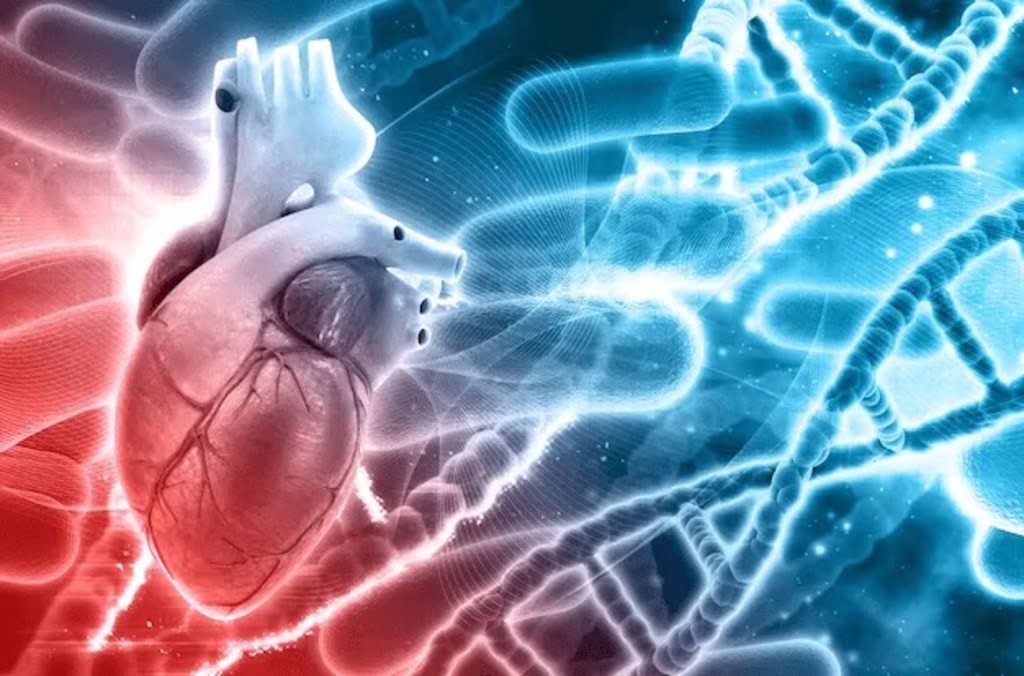
Heart disease is a broad term that encompasses various conditions that affect the heart or blood vessels, such as coronary artery disease (CAD), cardiomyopathies, channelopathies, and familial hypercholesterolemia (FH). These conditions can cause symptoms such as chest pain, shortness of breath, fainting, dizziness, palpitations, and even sudden death. Heart disease is a major cause of morbidity and mortality worldwide, and it is influenced by both environmental and genetic factors.
Genetic factors in heart disease

Genetic factors play a role in a person’s risk of developing certain heart diseases. Hereditary traits can increase the risk of heart disease or other related health conditions. For example, 2018 research estimates that 40–60% of people are susceptible to CAD due to genetic factors. A person may have certain gene alterations that affect their heart and heart functioning. These genes may make them more susceptible to developing heart disease.
Some heart diseases are caused by just one or a few genetic changes that have a very strong effect in causing disease. These are known as monogenic conditions, and they include uncommon disorders that mostly affect the heart’s muscles (such as hypertrophic cardiomyopathy) or the electrical system (such as long QT syndrome). Another example is FH, which causes very high cholesterol levels and may lead to premature CAD.
Most cases of heart disease are polygenic, which means they are associated with dozens of different gene variants, each of which raises risk by about 10%. Some variants occur in genes not previously suspected to affect cardiovascular risk. These gene variants can interact with each other and environmental factors, such as diet, smoking, stress, and physical activity, influence the development and progression of heart disease.
Types of Inherited Heart Conditions
There are several types of inherited heart conditions that can affect a person’s health and quality of life. Some of the most common include:
– Cardiomyopathies: These are conditions that affect the heart muscle, reducing its ability to pump blood. They can cause heart failure, arrhythmias, cardiac arrest, and sudden death. Examples of inherited cardiomyopathies include hypertrophic cardiomyopathy, dilated cardiomyopathy, and arrhythmogenic right ventricular cardiomyopathy.
– Channelopathies: These are conditions that affect the ion channels in the cells, which are responsible for sending electrical impulses that control the heart rhythm and contraction. They can cause arrhythmias, fainting, and sudden death. Examples of inherited channelopathies include long QT syndrome, Brugada syndrome, and catecholaminergic polymorphic ventricular tachycardia.
– FH: This is a condition that affects the metabolism of cholesterol, leading to very high levels of low-density lipoprotein (LDL) cholesterol in the blood. This can cause early and severe CAD, as well as other complications such as stroke and peripheral artery
disease.
Testing for inherited heart conditions
A person may suspect that they have an inherited heart condition if they have a family history of heart disease, especially at a young age, or if they experience symptoms such as chest pain, shortness of breath, fainting, or palpitations. A doctor may perform various tests to diagnose an inherited heart condition, such as:
– Physical examination: This may include checking the blood pressure, pulse, heart sounds, and signs of heart failure or valve problems.
– Electrocardiogram (ECG): This is a test that records the electrical activity of the heart, which can reveal abnormalities in the heart rhythm or structure.

– Echocardiogram: This is a test that uses ultrasound waves to create an image of the heart, which can show the size, shape, and function of the heart chambers and valves.
– Blood tests: These can measure the levels of cholesterol, triglycerides, and other biomarkers that may indicate heart disease or inflammation.
– Genetic tests: These can identify specific gene mutations or variants that are associated with inherited heart conditions. Genetic tests can be done on a blood or saliva sample, and they can provide information about the risk, diagnosis, prognosis, and treatment of
heart disease.
Management of inherited heart conditions
The management of inherited heart conditions depends on the type and severity of the condition, as well as the individual’s symptoms and preferences. Some of the possible management strategies include:
– Lifestyle modifications: These can help reduce the risk of heart disease and its complications, and they include eating a healthy diet, exercising regularly, quitting smoking, managing stress, and maintaining a healthy weight.
– Medications: These can help treat or prevent symptoms and complications of heart disease, such as chest pain, arrhythmias, high blood pressure, high cholesterol, and blood clots. Examples of medications include beta-blockers, calcium channel blockers, antiarrhythmics, statins, and anticoagulants.
– Devices: These can help monitor or regulate the heart rhythm or function, such as pacemakers, implantable cardioverter-defibrillators (ICDs), or ventricular assist devices (VADs).

– Surgery: This can help correct structural defects or blockages in the heart or blood vessels, such as valve repair or replacement, coronary artery bypass grafting (CABG), or heart transplantation.
Final thoughts on the role of genetics in heart disease
Heart disease is a complex and multifactorial condition that can be influenced by genetic factors. Some heart diseases are caused by single or few gene mutations that have a strong effect, while others are associated with multiple gene variants that have a modest effect. Genetic testing can help identify the risk, diagnosis, prognosis, and treatment of inherited heart conditions. However, genetic factors are not the only determinants of heart disease, environmental and lifestyle factors also play a role. Therefore, it is important to adopt a holistic approach to prevent and manage heart disease, which includes regular check-ups, lifestyle modifications, medications,
devices, or surgery as needed.
FAQs
Q: What are the symptoms of inherited heart disease?
A: The symptoms of inherited heart disease may vary depending on the type and severity of the condition, but they can include chest pain, shortness of breath, fainting, dizziness, palpitations, and sudden death. Some people may not have any symptoms until they experience a cardiac event.
Q: How is inherited heart disease diagnosed?
A: Inherited heart disease can be diagnosed by a combination of physical examination, electrocardiogram (ECG), echocardiogram, blood tests, and genetic tests. These tests can help identify the specific gene mutations or variants that are associated with inherited heart conditions.
Q: How common is inherited heart disease?
A: Inherited heart disease is not very common, but it can affect people of any age, gender, or ethnicity. According to the American Heart Association, about 1 in 200 people have an inherited heart condition.
Q: How can I prevent inherited heart disease?
A: Inherited heart disease cannot be prevented, but it can be managed by regular check-ups, lifestyle modifications, medications, devices, or surgery as needed. Lifestyle modifications can help reduce the risk of heart disease and its complications, and they include eating a healthy diet, exercising regularly, quitting smoking, managing stress, and maintaining a healthy weight.
Q: Can I pass inherited heart disease to my children?
A: Inherited heart disease can be passed to your children if you have a gene mutation or variant that causes or increases the risk of heart disease. The chance of passing the gene to your children depends on the inheritance pattern of the condition. For dominant inheritance, the chance is 50%, for recessive inheritance, the chance is 25%, and for X-linked inheritance, the chance is 50% for female carriers and 100% for male carriers. Genetic counseling can help you understand the risks and options for your family.



 Afrikaans
Afrikaans Albanian
Albanian Amharic
Amharic Arabic
Arabic Armenian
Armenian Azerbaijani
Azerbaijani Basque
Basque Belarusian
Belarusian Bengali
Bengali Bosnian
Bosnian Bulgarian
Bulgarian Catalan
Catalan Cebuano
Cebuano Chichewa
Chichewa Chinese (Simplified)
Chinese (Simplified) Chinese (Traditional)
Chinese (Traditional) Corsican
Corsican Croatian
Croatian Czech
Czech Danish
Danish Dutch
Dutch English
English Esperanto
Esperanto Estonian
Estonian Filipino
Filipino Finnish
Finnish French
French Frisian
Frisian Galician
Galician Georgian
Georgian German
German Greek
Greek Gujarati
Gujarati Haitian Creole
Haitian Creole Hausa
Hausa Hawaiian
Hawaiian Hebrew
Hebrew Hindi
Hindi Hmong
Hmong Hungarian
Hungarian Icelandic
Icelandic Igbo
Igbo Indonesian
Indonesian Irish
Irish Italian
Italian Japanese
Japanese Javanese
Javanese Kannada
Kannada Kazakh
Kazakh Khmer
Khmer Korean
Korean Kurdish (Kurmanji)
Kurdish (Kurmanji) Kyrgyz
Kyrgyz Lao
Lao Latin
Latin Latvian
Latvian Lithuanian
Lithuanian Luxembourgish
Luxembourgish Macedonian
Macedonian Malagasy
Malagasy Malay
Malay Malayalam
Malayalam Maltese
Maltese Maori
Maori Marathi
Marathi Mongolian
Mongolian Myanmar (Burmese)
Myanmar (Burmese) Nepali
Nepali Norwegian
Norwegian Pashto
Pashto Persian
Persian Polish
Polish Portuguese
Portuguese Punjabi
Punjabi Romanian
Romanian Russian
Russian Samoan
Samoan Scottish Gaelic
Scottish Gaelic Serbian
Serbian Sesotho
Sesotho Shona
Shona Sindhi
Sindhi Sinhala
Sinhala Slovak
Slovak Slovenian
Slovenian Somali
Somali Spanish
Spanish Sundanese
Sundanese Swahili
Swahili Swedish
Swedish Tajik
Tajik Tamil
Tamil Telugu
Telugu Thai
Thai Turkish
Turkish Ukrainian
Ukrainian Urdu
Urdu Uzbek
Uzbek Vietnamese
Vietnamese Welsh
Welsh Xhosa
Xhosa Yiddish
Yiddish Yoruba
Yoruba Zulu
Zulu